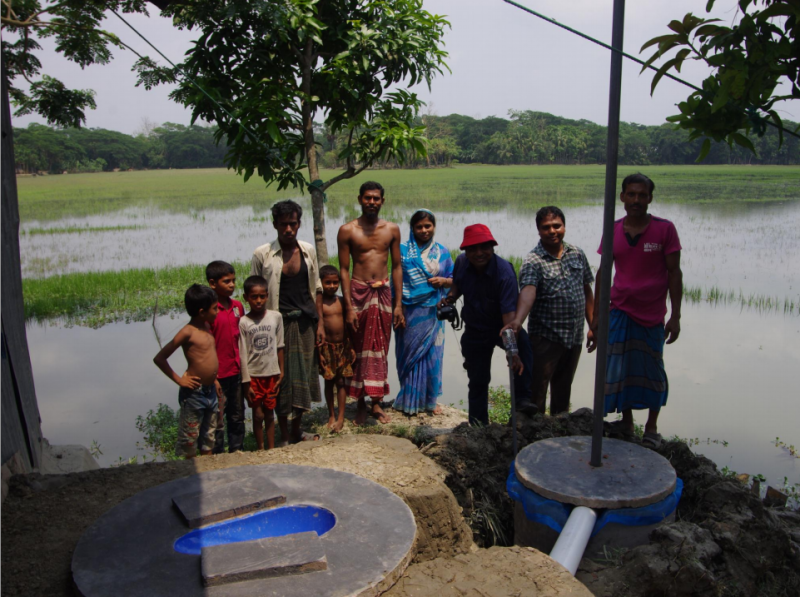- Forum
- categories
- Sanitation systems
- Toilets without urine diversion
- Pit latrines (simple, VIP, dual pit, pour flush)
- Latrine Pit Infiltration - Simplifying Bangladesh’s latrine pit debate through the FilTo Innovation
Latrine Pit Infiltration - Simplifying Bangladesh’s latrine pit debate through the FilTo Innovation
7560 views
- Elisabeth
-
- User is blocked
- Freelance consultant since 2012
Less- Posts: 3372
- Karma: 54
- Likes received: 932
Re: Latrine Pit Infiltration
Here is also now the video from the presentation by Jess on "To Seal or not to Seal: Simplifying Bangladesh’s latrine pit debate through the FilTo Innovation":
Or jump to time 39 min 30 s here:
You can listen to the questions and answers afterwards as well (at around 53 minutes), including Eddy Perez, Steve Sugden and others
And you can see me in this video, too, as I was the chair person.
Or jump to time 39 min 30 s here:
You can listen to the questions and answers afterwards as well (at around 53 minutes), including Eddy Perez, Steve Sugden and others
And you can see me in this video, too, as I was the chair person.
Dr. Elisabeth von Muench
Freelance consultant on environmental and climate projects
Freelance consultant on environmental and climate projects
Please Log in to join the conversation.
You need to login to reply
How about using an industry standard FIBC sack?
en.wikipedia.org/wiki/Flexible_intermediate_bulk_container
Could be helpful to transport the sand to the site and then be used as an outer shell that is water permeable but keeps the sand in place.
en.wikipedia.org/wiki/Flexible_intermediate_bulk_container
Could be helpful to transport the sand to the site and then be used as an outer shell that is water permeable but keeps the sand in place.
Please Log in to join the conversation.
You need to login to reply- jnmacart
-
Topic AuthorLess
- Posts: 8
- Likes received: 4
Thank you for your suggestions!
One of the biggest challenges in Bangladesh is that there is water everywhere. It is very difficult to keep water separate from systems and to keep it from pooling around latrines. Almost the entire country floods yearly. You can see in the picture that Elisabeth posted below what the area looks like in the rainy season. All the guide books say not to install latrines near water, but that is virtually impossible in most of country.
We currently have a mesh layer that separates the sludge and the sand and one option is to use two layers of mesh. We are trying to limit the amount of sand and sewing required. Sand is quite expensive and any sewing means that we can't quality control the installations as well and it is difficult to maintain continuity.
One of the biggest challenges in Bangladesh is that there is water everywhere. It is very difficult to keep water separate from systems and to keep it from pooling around latrines. Almost the entire country floods yearly. You can see in the picture that Elisabeth posted below what the area looks like in the rainy season. All the guide books say not to install latrines near water, but that is virtually impossible in most of country.
We currently have a mesh layer that separates the sludge and the sand and one option is to use two layers of mesh. We are trying to limit the amount of sand and sewing required. Sand is quite expensive and any sewing means that we can't quality control the installations as well and it is difficult to maintain continuity.
Please Log in to join the conversation.
You need to login to reply- Elisabeth
-
- User is blocked
- Freelance consultant since 2012
Less- Posts: 3372
- Karma: 54
- Likes received: 932
Re: Latrine Pit Infiltration - Simplifying Bangladesh’s latrine pit debate through the FilTo Innovation
Dear Jess,
Thanks for your post on 1 April about your presentation at FSM3. I think you forgot to provide the link to your presentation. It is this one:
To Seal or not to Seal: Simplifying Bangladesh’s latrine pit debate through the FilTo Innovation: Jess MacArthur, iDE, Dhaka, Bangladesh
www.susana.org/images/documents/07-cap-d...3-3-1-3MacArthur.pdf
Here is one photo of Jess's work in Bangladesh:
Regards,
Elisabeth
Thanks for your post on 1 April about your presentation at FSM3. I think you forgot to provide the link to your presentation. It is this one:
To Seal or not to Seal: Simplifying Bangladesh’s latrine pit debate through the FilTo Innovation: Jess MacArthur, iDE, Dhaka, Bangladesh
www.susana.org/images/documents/07-cap-d...3-3-1-3MacArthur.pdf
Here is one photo of Jess's work in Bangladesh:
Regards,
Elisabeth
Dr. Elisabeth von Muench
Freelance consultant on environmental and climate projects
Freelance consultant on environmental and climate projects
Attachments:
-
 Filtropicture.png
(Filesize: 823KB)
Filtropicture.png
(Filesize: 823KB)
The following user(s) like this post: JKMakowka, Alfonso
Please Log in to join the conversation.
You need to login to reply- jankn
-
 Less
Less- Posts: 35
- Karma: 8
- Likes received: 21
Some thoughts:
Similar to what Krischan just suggested, maybe extending the concrete rings down to the brick chips and sand layer could help preventing the surrounding soil to flush excess water into the sand layer and create preferential flow paths there during the monsoon season. This, however, would reduce the area of the infiltrative surface into the soil and would need to be considered, I guess.
Also, particular care could be given to prevent ponding during heavy rainfalls around the structure and not to create preferential flow along the outer sides of the concrete rings by proper back-filling during installation and extension of the concrete seal well above the ring diameter.
Similar to what Krischan just suggested, maybe extending the concrete rings down to the brick chips and sand layer could help preventing the surrounding soil to flush excess water into the sand layer and create preferential flow paths there during the monsoon season. This, however, would reduce the area of the infiltrative surface into the soil and would need to be considered, I guess.
Also, particular care could be given to prevent ponding during heavy rainfalls around the structure and not to create preferential flow along the outer sides of the concrete rings by proper back-filling during installation and extension of the concrete seal well above the ring diameter.
Jan Knappe
Doctoral Researcher on environmental performance assessment and modeling of on-site wastewater treatment systems
Trinity College Dublin & University of Limerick
Email: jan.knappe(at)tcd.ie, Twitter: @JanKnappe
Doctoral Researcher on environmental performance assessment and modeling of on-site wastewater treatment systems
Trinity College Dublin & University of Limerick
Email: jan.knappe(at)tcd.ie, Twitter: @JanKnappe
Please Log in to join the conversation.
You need to login to reply
Is this similar to "sand enveloped pit latrines"? As described here:
knowledgepoint.org/upfiles/14224596638193196.pdf
Maybe a layer of woven plastic fabric (could be stitched together from old sacks) could be used to envelope the sand to avoid the channel formation?
knowledgepoint.org/upfiles/14224596638193196.pdf
Maybe a layer of woven plastic fabric (could be stitched together from old sacks) could be used to envelope the sand to avoid the channel formation?
Please Log in to join the conversation.
You need to login to reply- jnmacart
-
Topic AuthorLess
- Posts: 8
- Likes received: 4
Latrine Pit Infiltration - Simplifying Bangladesh’s latrine pit debate through the FilTo Innovation
Hello forum,
In January I presented at the FSM3 Conference in Hanoi about some research that iDE-Bangladesh is doing in the southern tidal zones of the country around pit infiltration and safe leaching. We have been testing an in-hosue innovation called the FilTo which forces leaching through a layer of sand.
The FilTo worked perfectly until after the monsoon, when receding water began to channel out holes around the leaching areas right through the sand layer, effectively bypassing the sand filter.
We have been testing the FilTo by syphoning effluent off the bottom of the sand layer below the FilTo.
I would love to hear your suggestions of how to improve this technology and how to avoid the post monsoon issues.
Please do not try and implement this in your working areas yet. Once we get a version that works, I will happily share, but we aren't quite there yet.
In January I presented at the FSM3 Conference in Hanoi about some research that iDE-Bangladesh is doing in the southern tidal zones of the country around pit infiltration and safe leaching. We have been testing an in-hosue innovation called the FilTo which forces leaching through a layer of sand.
The FilTo worked perfectly until after the monsoon, when receding water began to channel out holes around the leaching areas right through the sand layer, effectively bypassing the sand filter.
We have been testing the FilTo by syphoning effluent off the bottom of the sand layer below the FilTo.
I would love to hear your suggestions of how to improve this technology and how to avoid the post monsoon issues.
Please do not try and implement this in your working areas yet. Once we get a version that works, I will happily share, but we aren't quite there yet.
The following user(s) like this post: JKMakowka
Please Log in to join the conversation.
You need to login to reply
Share this thread:
- Forum
- categories
- Sanitation systems
- Toilets without urine diversion
- Pit latrines (simple, VIP, dual pit, pour flush)
- Latrine Pit Infiltration - Simplifying Bangladesh’s latrine pit debate through the FilTo Innovation
Recently active users. Who else has been active?
Time to create page: 0.244 seconds








